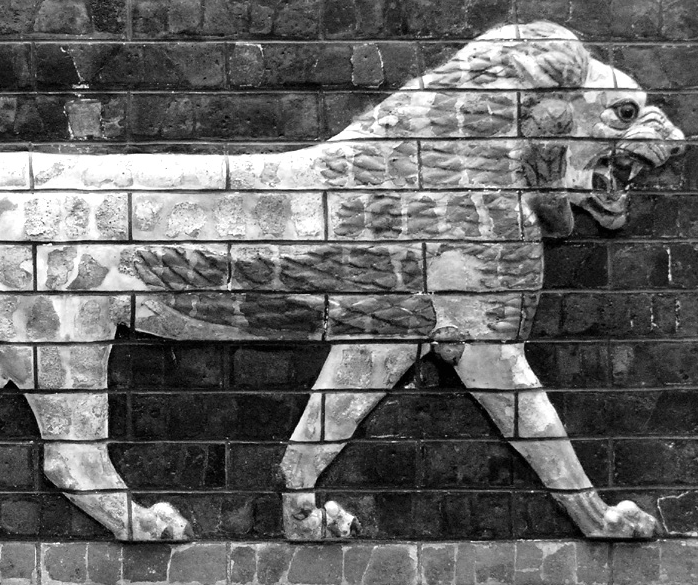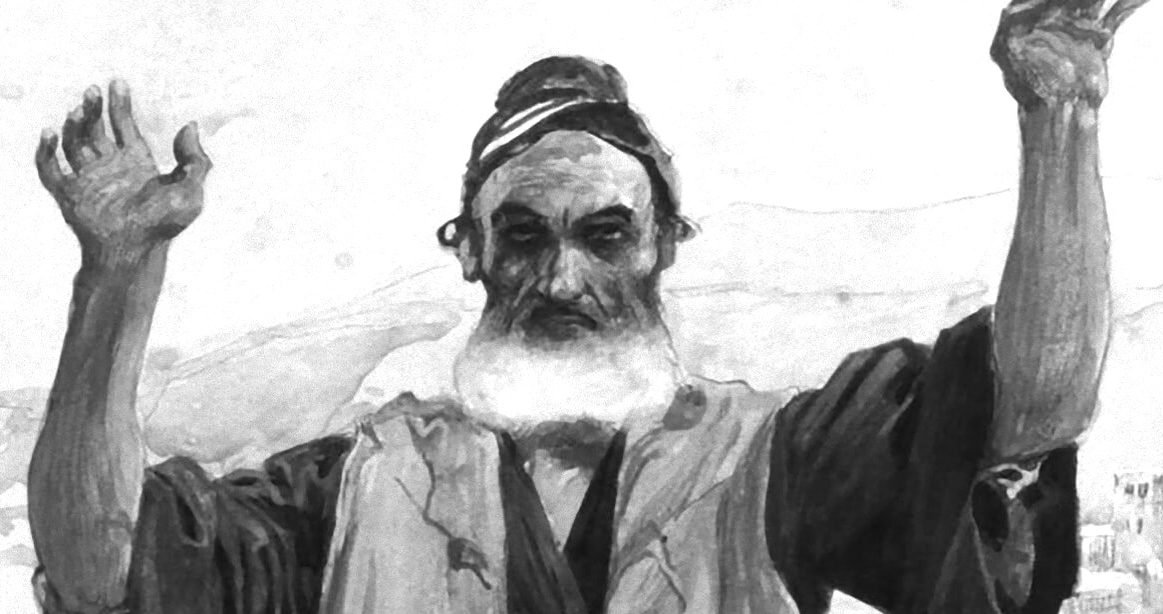The Faith of Habakkuk
“Although the fig tree shall not blossom, neither shall fruit be in the vines; the labour of the olive shall fail, and the fields shall yield no meat; the flock shall be cut off from the fold, and there shall be no herd in the stalls: Yet I will rejoice in Jehovah, I will joy in the God of my salvation” (Habakkuk 3:17,18).
Habakkuk lived during the time that the Babylonian Empire was threatening Judea. Habakkuk 1:15 speaks of the Babylonians as gathering the people of various nations in their “net,” verse 16 as sacrificing unto their gods, and verse 17 of Babylon’s campaign “to slay the nations.”
This perplexed Habakkuk, for it was apparent that Babylon was not more just than other nations, and they did not recognize the one true God, Jehovah. How, then, did God allow them to be the punishing agent for others, including Judea, where at least some of the people continued to worship God? “Thou art of purer eyes than to behold evil … wherefore lookest thou upon them that deal treacherously, and holdest thy tongue when the wicked devoureth the man that is more righteous than he? (verse 13).
CHAPTER TWO
Having expressed his concerns, Habakkuk then says, in the first verse of the second chapter, “I will stand upon my watch, and set me upon the tower, and will watch to see what he will say unto me, and what I shall answer” (Habakkuk 2:1). Habakkuk thus stands in a watch tower to receive whatever response Jehovah might be pleased to give the prophet about this apparent conundrum.
We often consider Babylon to be a picture of Christendom, because it is clearly so used in Revelation, extensively. But in this case it is different. Here Babylon is the instrument of God’s judgment, and Judea, the wayward people of God, represents Christendom during the harvest of the Gospel Age. This is not the only case of this. For example, the words of judgment against Christendom expressed in Revelation 18:22,23, compare closely with God’s judgment against Judea expressed in Jeremiah 25:10 (and also Jeremiah 7:34 and 16:9).

Babylon, like a ravaging lion, was the agent of God’s punishment.
The fact that Habakkuk stands upon “my watch” and sets himself upon a “tower” suggests the term “watchtower” such as appears in Isaiah 21:5,6, “Prepare the table, watch in the watchtower, eat, drink: arise, ye princes, and anoint the shield. For thus hath the Lord said unto me, Go, set a watchman, let him declare what he seeth.” Both this passage and the one in Habakkuk thus use the same symbolic concept of watching in a tower for an answer from God to explain the judgments that are at hand.
In the latter case, Isaiah 21:5,6, this is followed by an announcement that is well known to brethren as the one used in Revelation against Christendom. “Babylon is fallen, is fallen” (verse 9, compare Revelation 14:8, 18:2). That is the prophetic meaning both of Habakkuk and Isaiah. They apply to our day in history, that is, to the harvest of the Gospel Age, a time when strong judgments are due against Christendom.
These are depicted in Revelation chapters 15 and 16 as seven plagues the finally bring ruin to the great system. “The great city was divided in three parts [probably the coalition of dragon, beast, and false prophet that formed in plague six], and the city [singular, Sinaitic manuscript] of the nations fell: and great Babylon came in remembrance before God, to give unto her the cup of the wine of the fierceness of his wrath” (Revelation 16:19).
Apparently from the term “watchtower” in Isaiah 21:5 came the title of Br. Russell’s periodical, now affectionately termed the Reprints. Isaiah 21:10 says, “O my threshing, and the corn of my floor: that which I have heard of Jehovah of hosts, the God of Israel, have I declared unto,” and the Watchtower journal for 37 years sought to provide the best observations, and spiritual counsel, to the “corn of my floor,” as Br. Russell was able by God’s grace to provide.
Sometimes brethren pick up on specific opinions expressed in those pages, while not as careful to adopt and practice what really was the bulk of the testimony, namely, sweet Christian counsel. It would be unfortunate to insist upon favored opinions, which might be variable, with a spirit unlike the spirit of Christ that is reflected in 37 years of devoted exhortation. It would mean losing sight of the true values.
GOD’S ANSWER TO HABAKKUK
God acknowledged to Habakkuk that the avenger of his day was not a just institution. “Behold, his soul [of Babylon, the instrument of God’s judgment] which is lifted up is not upright in him. … Yea also, because he transgresseth by wine, he is a proud man [perhaps the king of Babylon], neither keepeth at home, who enlargeth his desire as hell, and is as death, and cannot be satisfied, but gathereth unto him all nations, and heapeth unto him all people” (Habakkuk 2:4,5).
Verse six refers to this avenger, Babylon, as “him that ladeth himself with thick clay,” apparently referring to building enterprises in the city of Babylon. (Compare Daniel 4:30, “The king spake, and said, Is not this great Babylon, that I have built for the house of the kingdom by the might of my power, and for the honour of my majesty?”).
In verse seven God affirms that Babylon also would be judged. “Shall they not rise up suddenly that shall bite thee … because thou hast spoiled many nations, all the remnant of the people shall spoil thee; because of men’s blood and for the violence of the land, of the city, and of all that dwell therein … woe to him that buildeth a town with blood, and stablisheth a city by iniquity!” (Habakkuk 2:7-12). Babylon was allowed by God to avenge the sins of Judea and others. But Babylon was not more righteous than others, and would itself meet their judgment at a later time.
God sometimes allows very bad instruments to bring judgment upon better, but blameworthy, people representing God. Thus Rome was allowed to bring judgment on Judea, and during the French Revolution infidels brought judgment upon France, who was allied with Papacy. Today also, some of the attacks upon establishments of Christendom are very far from righteous. They will be held to account later. But they are allowed to bring calamities upon old institutions whose judgment has been long predicted — and long due.
CHAPTER THREE
The punishment of Judea, brought by the Babylonian Empire, endured for decades. During this time, “in the midst of the years … in wrath remember[ing] mercy” (Habakkuk 3:2), God gave Ezekiel a vision of restoration of nine chapters, Ezekiel 40-48. This vision no doubt was received by the Israelites as hope for restoration after their punishment. On a broader scale, it refers to the hope of restoration for Israel and the world in the Kingdom. The judgments referred to in Habakkuk 3:5-16 are filled with phrases that apply to one or another of the judgments poured out through the Harvest, in preparation for the establishment of God’s Kingdom on earth.
Verse 6 — “He stood … and drove asunder the nation; and the everlasting mountains were scattered.” The winds of two world wars have broken up the “everlasting mountains” of Christendom’s European mainstays, the former governments that ruled that continent.
Verse 8 asks “was thine anger against the rivers?” The reminds us that the sixth plague in Revelation 16 is the drying of the river Euphrates, perhaps associated with a withering of economic strength in the western nations. We may have seen opening billows of this trouble already, but the brunt of it is yet ahead.

Habakkuk the prophet, concerned about his people.
Verse 11 says, “The sun and moon stood still in their habitation,” which seems to mean they refrained for their customary shining (in the same sense that the sun “stood” in Joshua 10:13). In other words, the sun and moon are darkened, which in Matthew 24:29 refers to the final traumas ending the harvest.
“When I heard, my belly trembled; my lips quivered at the voice; rottenness entered into my bones, and I trembled in myself, that I might rest in the day of trouble” (Habakkuk 3:16). The troubles have been intense. But they have been distributed over time, with intervening periods of peace between the tempests. Nevertheless, many brethren have suffered the ravages of war, some the poverty of economic blight, and some the terror of Islam. Other intensities still loom.
Verse 17 describes our time, and forward, while these troubles bring low the old order, at the same time elevating Israel in preparation for the Kingdom. “Although the fig tree shall not blossom, neither shall fruit be in the vine; the labour of the olive shall fail, and the fields shall yield no meat; the flock shall be cut off from the fold, and there shall be no herd in the stalls; Yet I will rejoice in Jehovah, I will joy in the God of my salvation.”
Israel is not yet blossoming with spiritual fruit for the nations. The Church is not yet yielding the wine of refreshment and atonement for the world. The work of the holy Spirit is not yet prospering among mankind. The fields, the world, do not yet yield the fruit of praise to God. The saints are not yet gathered beyond the vail, though that work progresses. The Ancient Worthies have not yet been installed in authority, leading the world to better things.
We still wait for all of those blessings. The years have stretched out more than brethren supposed they would. But the trend of events proceeds and the eye of faith can see in them progress toward the fulfillment of our hopes. We have every reason to “rejoice in Jehovah … and he will make [us] to walk upon high places” (Habakkuk 3:18,19). Every wonderful thing approaches.
— Br. David Rice
